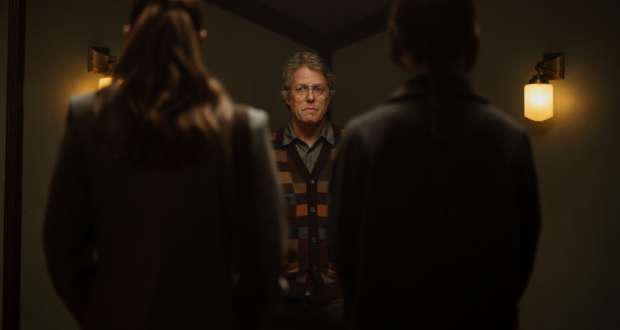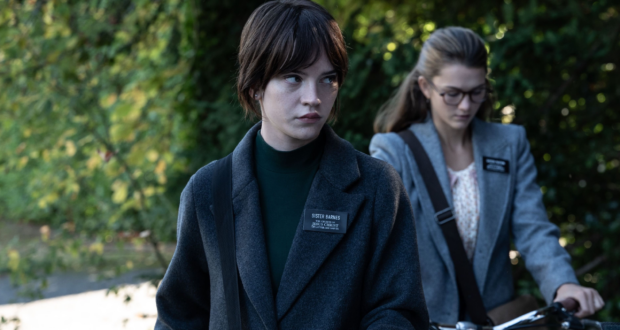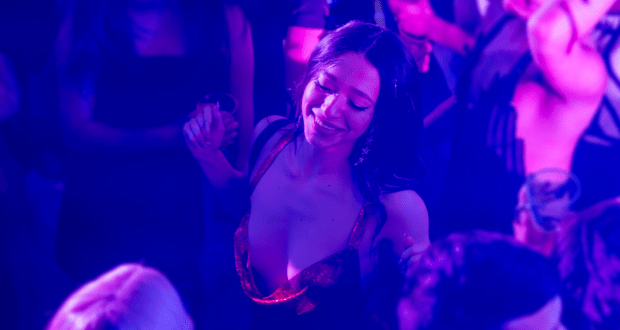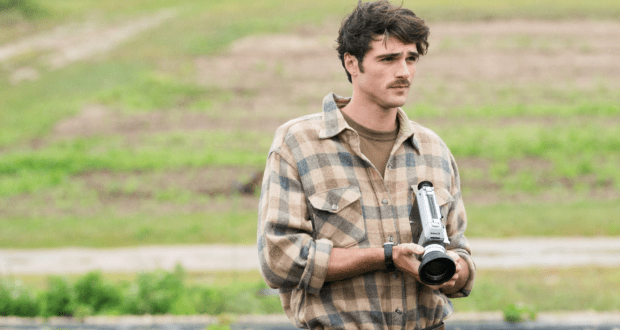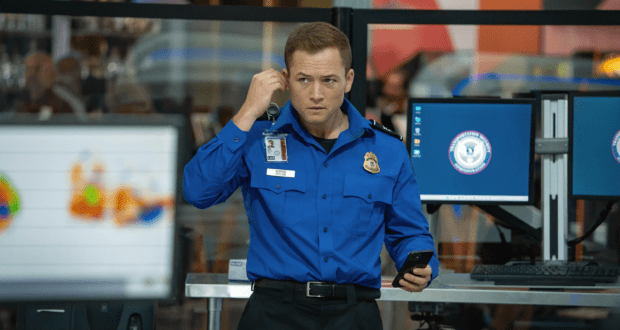In Heretic, co-writers and directors Scott Beck and Bryan Woods craft a psychological horror that delves deep into religious devotion, manipulation, and the disturbing allure of control. Anchored by a chilling performance from Hugh Grant and strong, dynamic portrayals by Sophie Thatcher and Chloe East, this film unfolds in an unrelenting atmosphere of dread and claustrophobia. With its sharp dialogue, foreboding atmosphere, and unsettling exploration of the boundaries between faith and fanaticism, Heretic is an unnerving meditation on the dangers of belief systems twisted to serve sinister purposes.
Premise:
The film opens with two missionaries, Sister Barnes (Sophie Thatcher) and Sister Paxton (Chloe East), on a routine proselytizing visit to a remote English countryside. Their first encounter with the enigmatic Mr. Reed (Hugh Grant) is innocuous enough, but it quickly spirals into a tense, suffocating ordeal that plays out almost entirely within the confines of Reed’s eerie, isolated home. This setting amplifies the film’s tension, creating a sense of confinement that mirrors the characters’ entrapment both physically and ideologically.
Beck and Woods construct a carefully paced story that oscillates between moments of silence, growing dread, and intense confrontations. The script delves into theological debate as Reed challenges Barnes and Paxton’s beliefs, initially in subtle ways before escalating to a full-blown ideological assault. Reed’s monologues about the “true nature” of belief are filled with cryptic suggestions, leading the missionaries—and the audience—through a maze of philosophical assertions that erode the characters’ confidence and lay bare their vulnerability.
Themes:
The film’s thematic focus is striking. As Reed dismantles the foundations of his visitors’ beliefs, his arguments seem rooted not in curiosity or debate, but in a predatory desire to control. Heretic cleverly blurs the line between skepticism and manipulation, highlighting the power imbalance that can occur when belief is wielded as a weapon. The film is not simply about questioning faith, but about how easily faith can be exploited to create vulnerability and a distorted reality. The script navigates this with a degree of subtlety that’s rare in psychological horror, allowing Reed’s intentions to surface gradually rather than forcing them to the fore.
Lead performances:
Hugh Grant’s performance as Mr. Reed is a revelation, far removed from his usual roles. He brings a level of menace that is both understated and potent, embodying the duality of charm and malevolence with an unnerving calm. His Reed is cerebral and articulate, but there’s a simmering hostility beneath his courteous facade that makes him increasingly unpredictable. Grant’s portrayal of a man consumed by his own warped convictions adds layers to his villainy, making Reed more than just a typical horror antagonist—he becomes a force of philosophical chaos.
Sophie Thatcher and Chloe East complement Grant’s performance beautifully. Thatcher’s Sister Barnes is driven by a quiet strength, embodying resilience even as her beliefs are challenged. She portrays Barnes as a woman firm in her faith, yet struggling to maintain control as Reed’s influence becomes more invasive. East’s Sister Paxton is the more hesitant of the two, and her journey from doubt to determination is both relatable and poignant. Together, the characters’ contrasting responses to Reed’s machinations build a complex emotional landscape, making their ordeal feel viscerally real.
Production design and atmosphere:
Heretic also deserves praise for its production design and atmosphere. Reed’s home is filled with religious artifacts, esoteric symbols, and unsettling decor, creating a disorienting environment that adds to the growing sense of dread. Cinematographer Chung Chung-hoon captures the tension through dim, oppressive lighting and claustrophobic framing, making the house feel like a labyrinth of hidden secrets. The muted color palette and shadow-heavy shots contribute to the film’s somber tone, while the sound design amplifies the psychological unease with unsettling whispers, distant footsteps, and sudden silences.
Structure:
The film’s narrative structure is punctuated by moments of raw horror, including scenes that reveal Reed’s true intentions with shocking brutality. Yet, Beck and Woods balance these moments with an almost intellectual restraint, ensuring the film doesn’t devolve into gratuitous violence. Each horror beat serves a purpose, building tension and reinforcing the film’s central themes rather than merely shocking the audience. The scares in Heretic are often psychological, stemming from the fear of losing control over one’s mind and beliefs—a unique angle that distinguishes it from more conventional horror narratives.
Where Heretic truly excels is in its ambiguity. The line between reality and illusion blurs as Reed manipulates the missionaries, leading them—and viewers—to question what is real. By the film’s conclusion, Beck and Woods leave enough open-ended elements to invite interpretation without sacrificing narrative coherence. The final scenes offer a satisfying, if unsettling, resolution, but the lingering questions about belief, reality, and autonomy haunt the viewer long after the credits roll.
Pacing issues:
If there’s a drawback to Heretic, it lies in its pacing. The deliberate buildup may feel slow to some, and the film’s dense philosophical dialogue could risk alienating audiences looking for a more conventional horror experience. However, for those willing to engage with its deeper questions and appreciate the slower burn, Heretic provides a thought-provoking and genuinely unsettling experience. The film’s philosophical underpinnings serve as both a strength and a potential barrier, but they also elevate it beyond mere genre thrills, making it a compelling addition to psychological horror.
Overall:
Ultimately, Heretic is a testament to Beck and Woods’ skill in blending horror with intellectual inquiry. It challenges viewers to consider the nature of belief and the human need for control, even as it delivers a gripping, claustrophobic tale of manipulation and psychological terror. With outstanding performances, an eerie setting, and a story that probes the very foundations of faith, Heretic is a memorable exploration of how easily belief can be turned against those who hold it dearest.
This unsettling and deeply reflective film is a must-watch for fans of psychological horror seeking something more nuanced than the typical fare. Heretic may not provide all the answers, but it certainly leaves audiences questioning—and that is where its true horror lies.
-
Acting - 10/10
10/10
-
Cinematography/Visual Effects - 8/10
8/10
-
Plot/Screenplay - 8/10
8/10
-
Setting/Theme - 8/10
8/10
-
Watchability - 8/10
8/10
-
Rewatchability - 6.5/10
6.5/10

